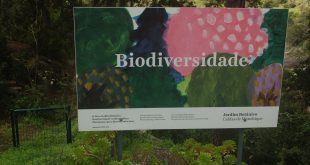Saturday, 18th Abril 2020
by Francisco Pedro
Some days ago, the editor of Eco123 reminded me that it’s now ten years since we were hit by the “coronavirus crisis” and suggested I write a text about it. I’ve just sat down to begin working on it. It’s the second full moon of Spring, this year. The date is 20 April 2030.
It’s curious now to think about that small world pandemic and how much it contributed towards the incredible changes we have experienced during this last decade.
We were still living under a wartime mentality – it was me against the other, and we suffered from the illusion that we were separate beings. We wasted mountain loads of resources, caught up, as we were, in a kind of game, something like “Simon says”, only this time “Simon” was the armed forces. Our heads were filled with all kinds of outlandish things, ranging from the sensational headlines of television news channels to the best choice of capsules for our coffee-making machines. Thousands of us were dying, just because we wanted to make our way to Europe. And the Autoeuropa factory was churning out brand-new cars to send to China in their thousands.
This crisis was one of the first moments in our lives when the economy calmed down, to the point where many of us suddenly stopped and noticed the cycles of nature and how we could learn things from the non-human world.
At that time, there was no recognition of the rights of rivers, forests and mountains. Ecocide was not recognised as a crime. Nor was the accumulation of wealth!
And now I look at the headlines of the latest issue of our magazine: we’re reaching the end of the trials brought by the people against the former leading figures of capitalism, who are being prosecuted for such diverse crimes as the building of motorways, the planting of eucalyptus forests and the exploitation of women workers. Open to the community, these trials have sentenced politicians and businessmen to emotional therapy and ecological training, while the property that they accumulated has been collectivised and shared among the population.
It’s curious how, ten years ago, giving so much money to so many people ended up making money so insignificant today. With the implementation of the Unconditional Basic Income, so many things that seemed so marginal at that time have continued to gain ever greater importance: popular resistance and the defence of our human rights, an emancipating education, physical and emotional care, the repopulation of villages and the reforestation of the cities, cooperatives and local currencies.
How joyful it is to see the groups and people that were previously discriminated against, those who suffered most with the coronavirus, now in the vanguard! What great relief we felt in freeing ourselves from that form of slavery that we called employment, so that we can all now use our talents to the full, devoting our passions and creativity to things that are meaningful for us and for society!
Do you remember the free and open collaboration that we enjoyed in that spring of 2020, enabling us to engage in research and to manufacture protective equipment in an efficient and decentralised manner? And the great contribution that this made to the end of patents and royalties? With the many doors that have opened since all knowledge and technology became open source, and all research became a cooperative endeavour, it is now quite hard to believe that these things were once hijacked by companies, who then competed with one another!
I still remember the new lease of life that regenerative agriculture was able to enjoy. The collective support that was given to women farmers and to caring for the land has led to our current abundance of healthy foodstuffs, even with the continuing spread of droughts and storms. Those who continue to use poisons and plant monocultures have to pay for the right to enjoy “non-organic” certification – do you remember how, at that time, it was the other way round?
Today, I was given the task of representing our magazine at the monthly media meeting. How hard we competed with each other – for the market share, for the formation of cliques, for the most sensational news stories and for the latest update on the number of deaths caused by the virus! We were all the same! And, now that we cooperate with one another, we freely share contents, resources, ideas and methods; in short, each project now flourishes in accordance with its own unique identity.
A friend of mine who works in TV sent me some hilarious images from the archives to post in our humorous section. These are news items from that same time, when there was a monoculture of white adult men wearing ties. With heart-breaking solemnity, they used to repeat such phrases as “employment”, “competitiveness”, “economic growth”, “the new Montijo airport” or the “state of emergency”!
 Eco123 Revista da Economia e Ecologia
Eco123 Revista da Economia e Ecologia


